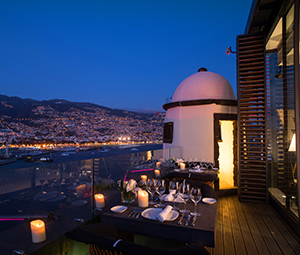Every year, the town of Câmara de Lobos overflows with light and colour to mark the celebration known locally as Festa de São Pedro.

The event has become a reference with deep roots in the traditions and cultural identity of the town, with the goal of preserving a centuries-old festivity. Fishermen here have celebrated St. Peter ever since the 17th century, when the Corpo Santo brotherhood was established and they started adorning their boats and holding a procession.
Between the 27th and 30th of June, the event features the usual musical entertainment, with the presence of noteworthy bands and artists, including popular Portuguese folksinger Quim Barreiros and many popular Madeiran artists.
On the 28th, the highlight is the Azeitonas group. The 30th sees Portuguese singer David Carreira take to the stage.
The adornments and lighting of the streets continue to be key to the attractiveness of the event, featuring creative urban art interventions.
The stalls serving food and beverages contribute to the festive ambience and also allow one to taste regional delicacies.
The parades are one of the high points of the event, on June 28th. Comprising about nine groups, they fill the downtown streets with entertainment, the aroma of basil and typical folk songs about the saints. Fireworks are scheduled for midnight.
The procession in honour of the Blessed Peter González, who in Portugal is a saint, is scheduled to take off at 7 p.m. on the 29th in the Chapel of Nossa Senhora da Conceição.
After this celebration, fishermen carry the litters in honour of St Peter, the apostle, and the Blessed Peter González, the patron of seamen.
This year’s edition of the event features some novelties at its closing, like the Blessed Peter González Ethnographic Parade, held here for the first time. The idea is based on the historical re-enactment of the processions held in the 19th century.












